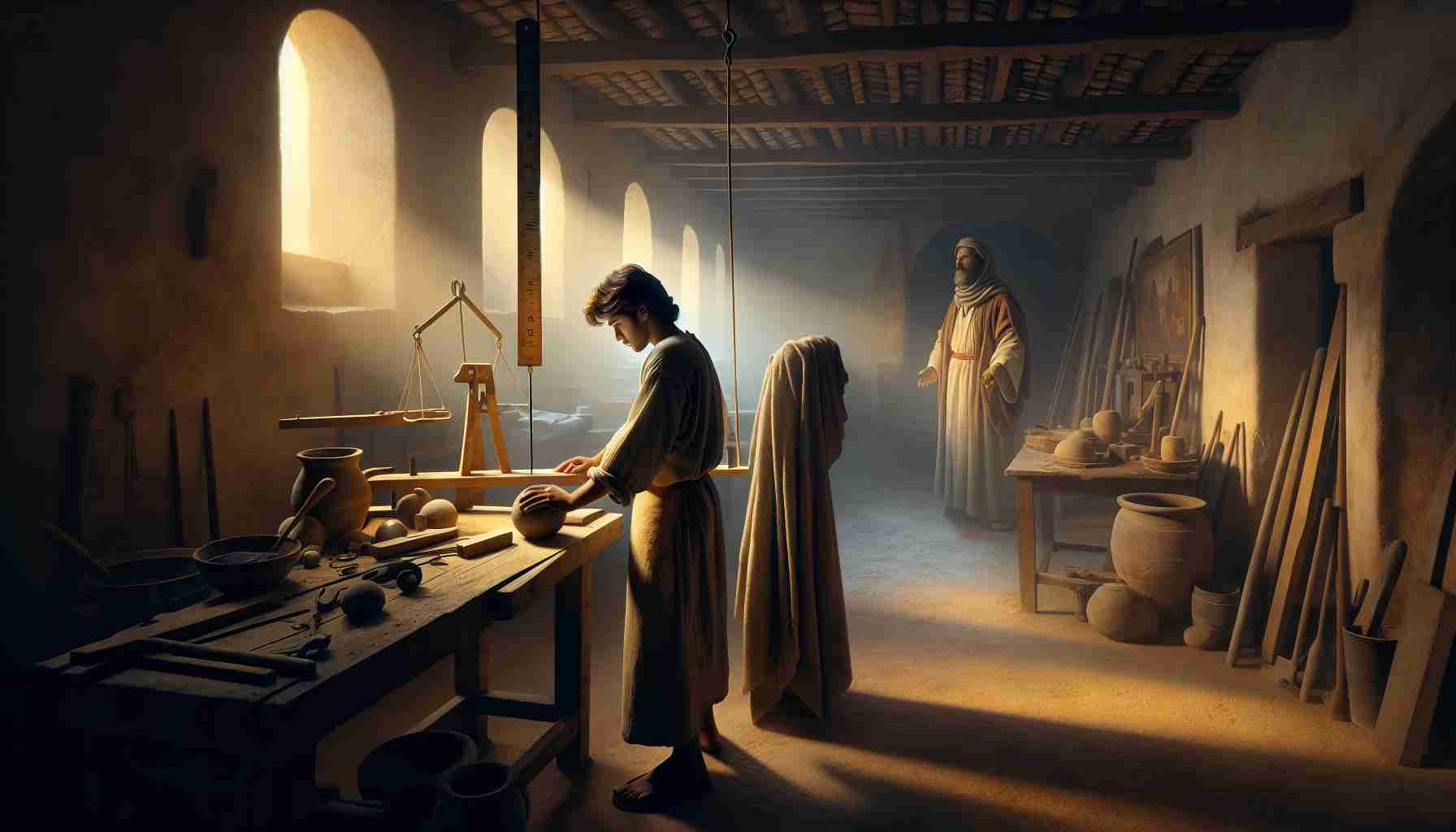

The day the prophet Amos came to Bethel, the marketplace never sounded quite the same again.
You won’t find my name in any scrolls. I was a brickmaker’s son, old enough to stir the clay, but young enough to still dream about being anything else. My father and I were pouring molds near the Temple when we first heard Amos raise his voice. He didn’t shout like the street sellers or laugh like the musicians. His voice cracked with something sharper—truth, maybe. Or grief.
He said the Lord had shown him a plumb line. I didn’t know what that was, so I tapped my father’s side. “What’s a plumb line?”
“It’s a tool,” he whispered, staring toward Amos. “Builders use it to see if a wall is straight.”
That made me confused. Why would the Lord show a prophet a builder’s string?
Amos must have seen the puzzled looks, because he said, “The Lord is measuring Israel like a wall—and we’re leaning enough to fall.”
People didn’t like that. One of the priests, a man named Amatziah, told him to go back to Judah. He said our king, Yerovam—King Jeroboam—wouldn’t stand for such words.
I remember the way Amos looked at him. Calm but strong. “I’m no prophet’s son,” he said. “I used to tend sheep and gather figs. But the Lord took me and said, ‘Go and speak to My people Israel.’ So I did.”
That’s when something in me changed.
Until that moment, I thought only priests and kings could speak for God. But Amos said he was a fig gatherer—someone like me, someone from the dirt like my father. And yet, God had chosen him. I felt something burn in my chest. If God could speak through Amos, maybe He paid attention to clay mixers and brick layers, too. Maybe He was watching more than just the kings and the altars.
Later that night, I asked my father, “Is our wall straight?”
“What wall?”
“The one Amos spoke about. The one God was measuring.”
He didn’t answer at first. Then he put down his cup. “We build strong walls, son. But sometimes we forget why we built them—or who we left outside them.”
I didn’t sleep much that night. I kept wondering if our hearts were leaning in the wrong direction.
The next day, the marketplace was quieter. Amos had left. Some said he went back to Tekoa, his town in the south. Others claimed the king would send men after him. But his words stayed.
Years later, when the kingdom truly did fall—when Assyria came and the northern tribes scattered like pottery shards—I remembered the plumb line. I remembered Amos standing straight while the nation leaned.
And even now, when I stir clay or place a brick, I keep a string in my pouch—not just to check my walls, but to check myself. A plumb line isn’t just for buildings. Sometimes, it’s what the Lord uses to see if our hearts are upright, too.
The day the prophet Amos came to Bethel, the marketplace never sounded quite the same again.
You won’t find my name in any scrolls. I was a brickmaker’s son, old enough to stir the clay, but young enough to still dream about being anything else. My father and I were pouring molds near the Temple when we first heard Amos raise his voice. He didn’t shout like the street sellers or laugh like the musicians. His voice cracked with something sharper—truth, maybe. Or grief.
He said the Lord had shown him a plumb line. I didn’t know what that was, so I tapped my father’s side. “What’s a plumb line?”
“It’s a tool,” he whispered, staring toward Amos. “Builders use it to see if a wall is straight.”
That made me confused. Why would the Lord show a prophet a builder’s string?
Amos must have seen the puzzled looks, because he said, “The Lord is measuring Israel like a wall—and we’re leaning enough to fall.”
People didn’t like that. One of the priests, a man named Amatziah, told him to go back to Judah. He said our king, Yerovam—King Jeroboam—wouldn’t stand for such words.
I remember the way Amos looked at him. Calm but strong. “I’m no prophet’s son,” he said. “I used to tend sheep and gather figs. But the Lord took me and said, ‘Go and speak to My people Israel.’ So I did.”
That’s when something in me changed.
Until that moment, I thought only priests and kings could speak for God. But Amos said he was a fig gatherer—someone like me, someone from the dirt like my father. And yet, God had chosen him. I felt something burn in my chest. If God could speak through Amos, maybe He paid attention to clay mixers and brick layers, too. Maybe He was watching more than just the kings and the altars.
Later that night, I asked my father, “Is our wall straight?”
“What wall?”
“The one Amos spoke about. The one God was measuring.”
He didn’t answer at first. Then he put down his cup. “We build strong walls, son. But sometimes we forget why we built them—or who we left outside them.”
I didn’t sleep much that night. I kept wondering if our hearts were leaning in the wrong direction.
The next day, the marketplace was quieter. Amos had left. Some said he went back to Tekoa, his town in the south. Others claimed the king would send men after him. But his words stayed.
Years later, when the kingdom truly did fall—when Assyria came and the northern tribes scattered like pottery shards—I remembered the plumb line. I remembered Amos standing straight while the nation leaned.
And even now, when I stir clay or place a brick, I keep a string in my pouch—not just to check my walls, but to check myself. A plumb line isn’t just for buildings. Sometimes, it’s what the Lord uses to see if our hearts are upright, too.